Club of Amsterdam
Video
Credits: Marc Schaaps Film & TV, Andreas van Engelen, Sound Design
Hardy F. Schloer, Owner, Schloer Consulting Group
Democracy is dead, as we know it!
https://youtu.be/471KIe-IbzY
As the beauty is in the eye of the beholder democracy has many possible definitions. One may say it was a result of a process of reconciliation between the aristocratic ruling class and its subjects from the beginning of the industrial revolution. Clearly, recognizing the rights of people’s decision making instead of oppressing them proved to be a more efficient tool of governance. To keep the safety of the mass production at the industries’ factories and the necessity of a consistent environment for “the free flow of goods”, monetary stability and exchange ability became more important than imposing the direct power of the ruling class.
However, democracy has not only failed to prevent big wars and general justice it has become insufficient as a rule of principle at the age of information as systems became rather complicated for having a deep knowledge in many different fields. The vote for the late 300 page EU constitution draft was too much a demanding task to go through, let alone studying and understanding the details of the text. The same applies to numerous other issues awaiting ruling from our democracies. The technical difficulty of getting people’s attention and asking them to focus on many issues than one can handle at a life time while the world is already an increasingly challenging place for earning one’s living and even survival, is it reasonable to expect a fair judgement from the majority to make the best decisions for the future?
Are European Democracies fit for dealing with the challenges ahead? Do we need new tools? New decision making processes? Or do we need to radically renew our approach?
Concept by Iclal Akcay
The speakers and topics are:
![]() Ben Crum, Associate Professor, Department of Political Science. Vrije Universiteit Amsterdam
Ben Crum, Associate Professor, Department of Political Science. Vrije Universiteit Amsterdam
The essence of democracy and the challenge of internationalization
The present uprisings in the Arab world serve to remind us how precious democratic government is. At the same time, democracy is always fragile because it is build upon the recognition of our fallibility and the existence of reasonable disagreement in society. Also, democracy is inherently open-ended. One of the major present challenges for European democracy is the internationalisation of politics. This challenge requires us to rethink democracy, both with respect to international institutions and with respect to the interaction between national and international democracy.
![]() Maurice de Hond, Dutch pollster and entrepreneur
Maurice de Hond, Dutch pollster and entrepreneur
Heading for the perfect storm
The European version of democracy designed in the 19th century was working reasonably well the second half of the last century.
But problems are mounting. The much better educated population has infinite sources of information and can also be the sources of information..
But the political system stays a static top downs construction without any trust in the population.
The forming of the EU and the way it is governed means an even more static construction in an era where you need flexibility and speed of action.
The need for large budget reductions combined with a lot of money spent for the debt of countries like Greece will create an optimal situation for anti-establishment and anti-EU parties to win national elections.
And the moment one of those parties (think of Marine Le Pen) rises to power this can have big consequences for the way the EU operates and will mean an extra stimulus for a domino effect.
This will mean the end of democracy as we know it.
![]() Hardy F. Schloer, Owner, Schloer Consulting Group
Hardy F. Schloer, Owner, Schloer Consulting Group
Democracy is dead, as we know it!
Democracy served only as an evolutionary transition between the old systems of Healers, Druids, Kings and Emperors that ruled by charisma and a single voice, to become a temporary solution, whereby a slim majority of uninformed people impose their subjective rules of dogma and mostly unsafe preference onto a large minority; equally subjective in their judgments. The future cannot be democracy, if this planet should survive, but a form of scientific and evidence based governing methods focused by very large consensus on what really matters in the peaceful survival of mankind.
19:00 – 20:00
Introduction by our Moderator
![]() Kwela Sabine Hermanns
Kwela Sabine Hermanns
Part I:
![]() Ben Crum, Associate Professor, Department of Political Science. Vrije Universiteit Amsterdam
Ben Crum, Associate Professor, Department of Political Science. Vrije Universiteit Amsterdam
The essence of democracy and the challenge of internationalization
![]() Maurice de Hond, Dutch pollster and entrepreneur
Maurice de Hond, Dutch pollster and entrepreneur
Heading for the perfect storm
![]() Hardy F. Schloer, Owner, Schloer Consulting Group
Hardy F. Schloer, Owner, Schloer Consulting Group
Democracy is dead, as we know it!
20:00 – 20:30
Break with snacks & drinks.
20:30 – 21:15
Part II:
Open discussion

Ben Crum
Associate Professor, Department of Political Science. Vrije Universiteit Amsterdam
Ben Crum is Associate Professor in Political Theory at the Vrije Universiteit Amsterdam. He studied in Amsterdam, London and Berlin, and holds a PhD from the European University Institute, Florence. Before joining the Vrije Universiteit he worked at the Centre for European Policy Studies in Brussels, the Netherlands Scientific Council for Government Policy in The Hague, and policy consultancy firm Research voor Beleid in Leiden.
In his academic work, Crum examines how the internationalization of politics challenges established political theoretical insights. Over the last decade, his research has focused on the issues of democracy and constitutionalisation in the European Union. He has published on these topics in newspapers, advisory reports and major international political science journals. This autumn, his monograph Learning from the EU Constitutional Treaty will be published by Routledge.
www.bencrum.nl

Maurice de Hond
Dutch pollster and entrepreneur
De Hond studied social geography at the University of Amsterdam, obtaining a degree in 1971. He worked for the university, as assistant with the Sociaal Geografisch Instituut, but became a project leader for Interview-NSS in 1973. He founded Cebeon with Hedy d’Ancona in 1975, a market research firm targeting the non-profit sector, which he left in 1980 to become a director at Interview-NSS, later a commissioner until 1999. Starting in the mid-80s, De Hond started doing consultancy work for various companies, including Vendex, ITT and Wegener. In 1998, he was one of the founders of Newconomy. He now polls through his own company, and internet site Peil.nl.
www.mauricedehond.nl
www.peil.nl

Hardy F. Schloer Hardy F. Schloer is a strong team builder, entrepreneur, accomplished scientist and visionary theoretical thinker with extensive people and public relation skills. For three decades now Schloer has built successful global technology solutions and practical problem-solving infrastructures for clients and partners in the Americas, Europe and Asia. Schloer has extensive hands-on experience in the design and the conceptualization of successful solutions and complex technology architectures on global scale. His strong ability to view problems through their complex layers of context has enabled him to become a highly effective analyst and ‘out-of-the-box’ thinking problem solver. Schloer is founder and former CEO of RavenPack AG in Germany and RavenPack International in Spain, a world leader in computational linguistics and real-time financial applications. Schloer is also the inventor of numerous Information and Communication Technology patents and of the Quantum Relation Theory, a breakthrough concept in Artificial Intelligence. The Quantum Relation Theory has been academically reviewed and discussed. In 2001 Schloer received the award of “One of 25 Best Technologies of the Future” from NetInvestor in Germany for the invention of his Quantum Relation-based technology platform, ‘RavenSpace’. Schloer made also important intellectual contributions to the field of healthcare with his groundbreaking concept ‘AlphaMedic’, a global approach to modern healthcare that envisions globally standardized, centralized and AI managed patients record keeping, combined with computer assisted real-time medical diagnostics and automated clinical trials in a global 24/7 processing approach. Schloer’s AlphaMedic concept to healthcare problems has received a European Grant and has been published and discussed in the press and online healthcare publications Schloer has developed a strong transdisciplinary and intercultural approach to problem-solving consultancy that is now leading in its field. He is an internationally acclaimed speaker and is frequently invited to international conferences, public discussion panels and other global Think Tank events. |

Kwela Sabine Hermanns
Kwela is a highly focussed, process-oriented entrepreneur and innovation specialist with many years of business experience in education, research, training and project management in the creative industries.
She is bi-lingual in English and German, owns a Masters degree in New Media Studies and trained in small business innovation at Copenhagen Business School.
She coaches and trains people and organisations in goal implementation and dynamic change management techniques.
”My own goal is to support inter-disciplinary innovation towards value based and surprising sustainable futures. I combine a highly analytical and strategic mind with a passion for team work, people and relationship buidling.”
www.portaltoyourdreams.com
Impressions Credits: John Grüter, photos 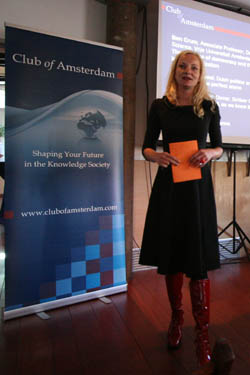 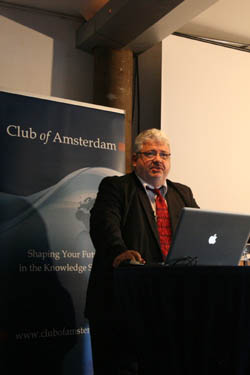 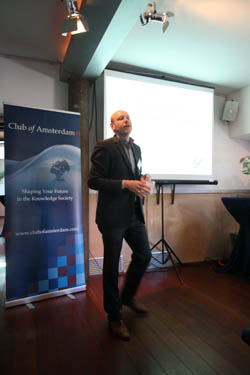 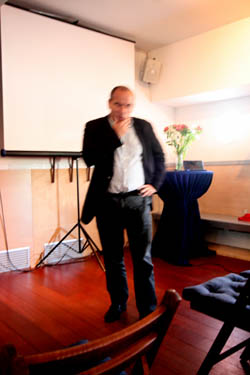 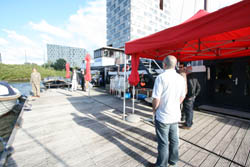 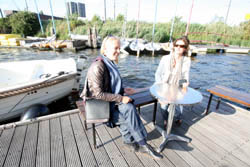 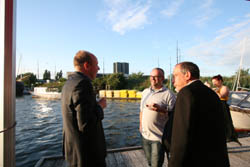 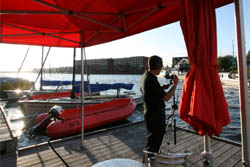 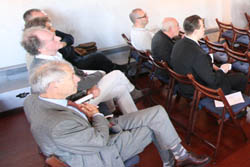 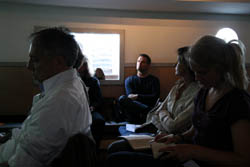 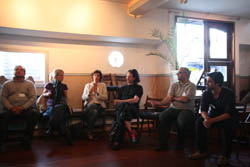 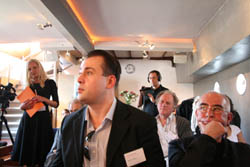 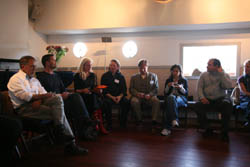 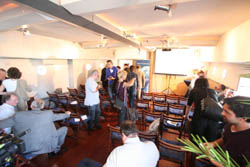 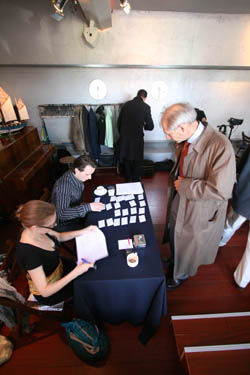 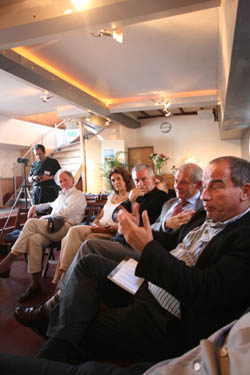 |






Customer Reviews
Thanks for submitting your comment!